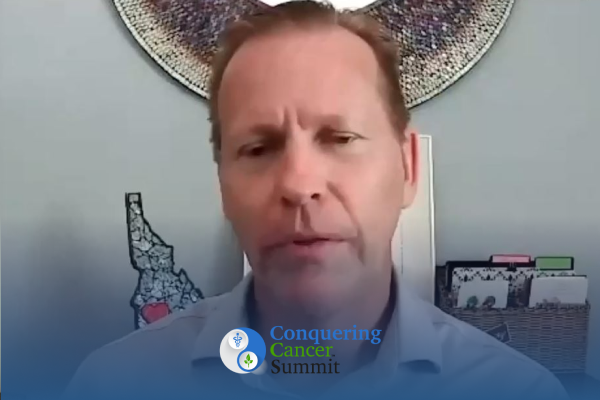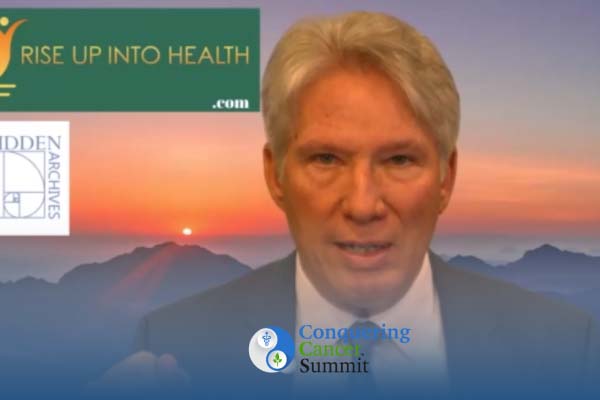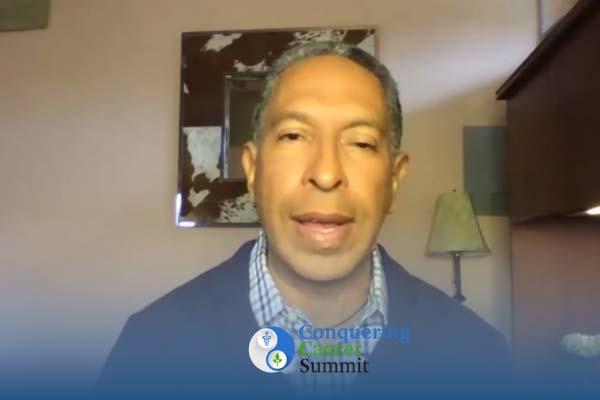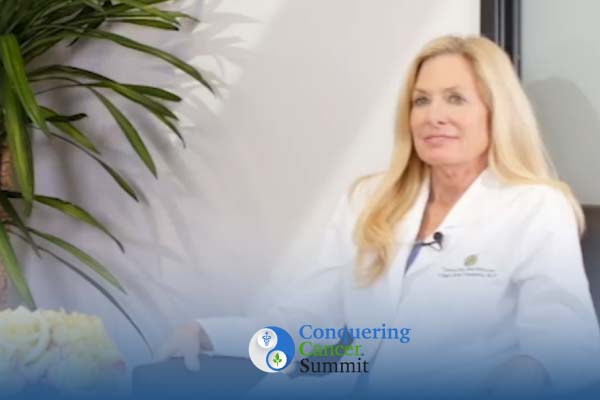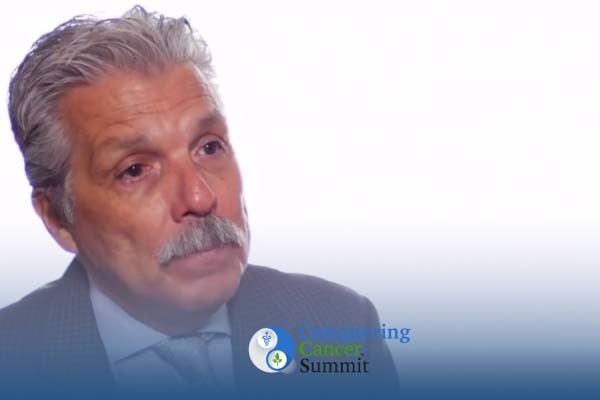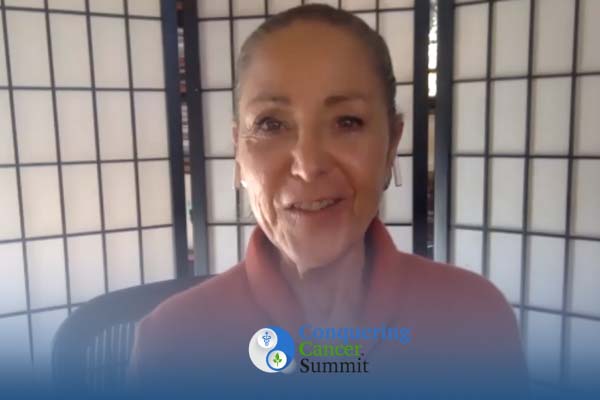Join the discussion below
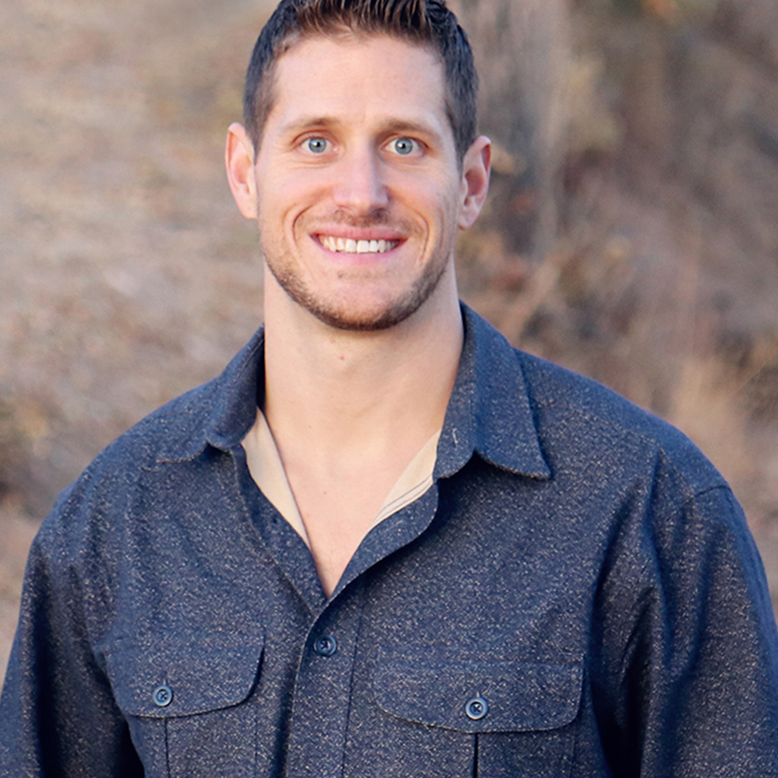
Nathan Crane is an award-winning author, inspirational speaker, plant-based athlete, event producer and 18x award-winning documentary filmmaker. Nathan is the Founder of The Panacea Community, Creator of the Global Cancer Symposium, and Director and Producer of the documentary film, Cancer; The Integrative Perspective. He is also the Director of Strategic... Read More
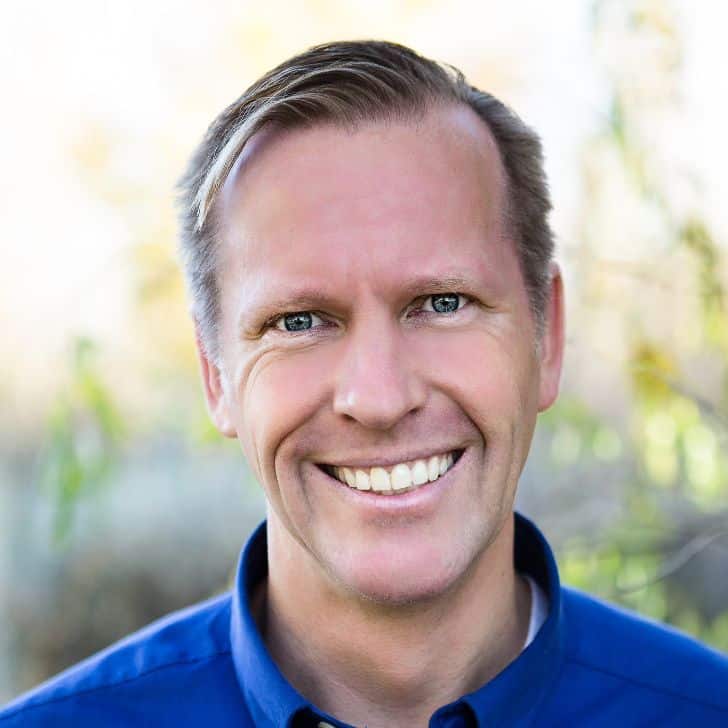
Michael Karlfeldt, ND, PhD, is a Board Certified Naturopath (CTN® ) with expertise in IV Therapy, Applied Psycho Neurobiology, Oxidative Medicine, Naturopathic Oncology, Neural Therapy, Sports Performance, Energy Medicine, Natural Medicine, Nutritional Therapies, Aromatherapy, Auriculotherapy, Reflexology, Autonomic Response Testing (ART) and Anti-Aging Medicine. Dr. Michael Karlfeldt is the host of... Read More
Nathan Crane
Hey, it’s Nathan Crane, director of the Health and Healing Club, and host of the “Conquering Cancer Summit.” And I’m really excited today that you’re joining us for this really special interview with Michael Karlfeldt, N.D., Ph.D. I’m gonna read his bio and we’re gonna dive into some really empowering information and strategic integrative naturopathic solutions, whether your concerns are helping yourself with cancer or helping somebody you love with cancer. So Michael Karlfeldt, N.D., Ph.D, naturopathic doctor, PhD, runs a Karlfeldt Center in Boise, Idaho, Dr. Karlfeldt, and his staff pride themselves in being compassionate cancer warriors, focusing on cutting edge integrative cancer therapies, working with international leaders to provide cancer solutions for each person.
Dr. Karlfeldt was in his 20s, when he lost his father to colon cancer, which was a big part of leading him on this path to helping people around the world learn how to prevent and heal from cancer. Currently he hosts the TV show, “True Health, Body, Mind, Spirit,” and the radio show “Health Made Radio,” where he connects with international leaders in the integrative health arena. Also, be sure not to miss his internationally recognized podcast, “Integrative Cancer Solutions with Dr. Karlfeldt,” you can find it on iTunes, Google Play, and he features cancer survivors sharing how they beat cancer, truly inspiring show and podcast. Make sure to go listen to that. Dr. Karlfeldt, thank you so much for joining us.
Michael Karlfeldt, N.D., Ph.D
Well, thank you so much for having me, Nathan. I’m really excited about what we’re gonna chat about today.
Nathan Crane
So I know you’re primarily focused on naturopathic oncology. Can you talk a little bit about the differences between naturopathic oncology and conventional oncology?
Michael Karlfeldt, N.D., Ph.D
Well, one of the key component is to recognize that cancer is not an isolated event. It’s a whole body experience, meaning that the cancer, if you just focus on cancer, you radiate it, you use chemo, you cut it out. You forget then the environment where actually the cancer developed in. So in naturopathic oncology, you focus on that environment, that terrain, that then led up to the development of this cancer and see what it is and what kind of factors that you need to change in order to be able to make sure that this cancer does not thrive in that environment.
So I kinda . You know, if you have a rat infested area, I mean, yes, you can kill the rats, but if you don’t clean up the area, then they’re just gonna reoccur. It’s just gonna come back again and again, it’s the same thing with cancer. So conventional therapy, even though it can be very powerful at times, you know, and you see really kind of immediate results, you see that immediate reduction as a use of chemo or radiation, or you cut it out and you feel, “Yay, we got it.” But since we still have the same terrain, we still have the same environment. And at the end of these types of therapies, we are actually then weaker. In fact, our terrain is even worse at that time. So the likelihood of it reoccurring, which is most common, the scenario, is very, very big. So the key is to look then, you know, look at the individual nutritionally, you know, look at them spiritually, emotionally.
You wanna look at them from all angles and see, “What is that driving force that caused the cancer?” And you address those and make sure that they are in a good balanced state. So we clean out their environment, so the rats can’t come back again. And that’s kinda the difference between naturopathic oncology. Look up on the end of the individual as a whole, instead of cancer, just as something that all of a sudden appeared and we’re just killing the cancer and not looking upon the individual.
Nathan Crane
Yeah. I love that analogy. And, you know, looking at… I know you have a quote on your website, about what naturopathic oncology is, you say, and this is @thekarlfeldtcenter.com. And you just say, you know, “You treat the person and the cancer,” right? It’s not just treating the cancer, but you’re looking at, as you talk about the terrain, and the whole person, but also not just the physical terrain, but the mental, emotional, spiritual, you know, experience of the person as well. So it’s a very holistic approach, which I think is critical. I think it’s so important. And it’s certainly something that we’re missing in our conventional oncology today, right?
Where they just look at cancer as the rat and kill the rat and get it out of there as quick as we can. Who cares what happens to the person? Who cares what happens to the… And, you know, not intentionally they don’t care, but I’m just saying they don’t take that into consideration, all of the causative factors that led to the cancer in the first place. And, you know, I think naturopathic oncology is the way of the future because you not only understand the cancer, what causes cancer, you know, and what you can do about it. But you look at the whole human being and how do you improve your overall health and wellness, happiness, life purpose, you know, wellbeing and heal at the same time?
Michael Karlfeldt, N.D., Ph.D
And the key is also to empower the individual. So when a lot of patients go through traditional care, it’s kinda like they almost drop off their body and have it worked on and then pick it up after, meaning that they are not empowered in that process. So studies show that an individual that is engaged and is part of the treatment, which was naturopathic oncology, is really focuses on, their outcome is so much better, because we recognize, you know, the immune system plays is directly connected with how we feel, how we think. And so if we move in fear or we move in disempowerment, then we are not going to be very successful. But if we shift and come out of a place of power, which is a whole individual that is, you know, strong, strengthened and does things with purpose, they’re gonna have much better outcome.
Nathan Crane
Yes. So if somebody is tuning in right now, has cancer, you have a conventional oncologist, you know, and you’re asking them questions, you wanna understand the causes and other solutions and be more informed, and they’re just kind of, you know, trying to shake you off and tell you, “Hey, don’t worry about it,” or, you know, “It’s none of your business,” or whatever, you might not have the right oncologist, right? Because if they’re not willing to educate themselves and, or educate you and bring you along in the process and help you to understand what’s really going on, you know, as you said, you see better outcomes when the patient is actually educated and empowered and part of the healing process.
So I think that’s important takeaway there. So I wanna ask you, obviously, in working with cancer patients for years, you know, you’ve seen a lot of things, and probably some really interesting things, and have probably seen some incredible case studies, I’d love maybe for you to share in a moment as well. But I wanna… I’m curious if there’s one or two things that stick out to you, that you’ve discovered about cancer or helping heal from cancer over the years, that you realize now that most people just don’t know about and maybe it could actually help save their lives?
Michael Karlfeldt, N.D., Ph.D
Well, one of the things is to recognize that it is a very complex disease in itself. And so a lot of patients say, they think, “Well, I’m gonna go and just do vitamin C IV,” you know, when they think integrative, or, “I’m just gonna take, you know, this pharmaceutical or this herb,” and not recognizing that you need to address it from so many different angles at the same time, you know? So that’s why it’s important to really do a huge inventory as to, “Where am I at spiritually, where I’m at emotionally, where I’m at nutritionally?” You know, “I’m I dealing with infectious agents? Am I dealing with heavy metals? Am I dealing with all these things?” So you can’t just think that, “I take this one thing and that’s gonna fix it all.” That’s why it’s important to work with people that are very educated in this area so that they can then address all these different factors, you know, looking upon you as a whole.
So I think that is one of the things that I’ve learned tremendously in that aspect. And the other component is, the issue with stem cells, cancer stem cells. You know, not recognizing their importance and their effect. And by using traditional care like the chemo, radiation, surgery, all of that will activate the activity of the cancer stem cells. And to be able to then control their activity, utilizing them a lot of these integrative approaches that are really powerful and down-regulating these activities so that they stay dormant while you’re then going after the cancer and at the same time as supporting the individuals. So those are two, I think, really, really important components for individuals to recognize. In addition to that, you know, just because the cancer goes away, doesn’t mean that you are cancer free.
You’re you’re actually from… From what I seen with patients is that cancer is a chronic disease, which means that once it’s gone, you can’t just relax and go back to your normal habits. You know, I had one patient that, you know, he was a failed medical cancer patient, and, you know, was supposed to die, I don’t know, in one or two months or so, and turned him around. He was doing great, fantastic. He ate well, he was on a protocols. And you know, five years later, he obviously, he was relaxed and thinking, you know, “This is not part of my life anymore.” So he had a stressful event, you know, he was moving, so he didn’t sleep well and he didn’t eat well, and the cancer returned. And they took him in for chemo, and then he died the day after.
Nathan Crane
Wow.
Michael Karlfeldt, N.D., Ph.D
So it’s as really important to keep your habits and don’t stop them, recognizing you still need to eat well, you still need to meditate, you still need to exercise, you still need to breathe fresh air, you still need to do all these things. Don’t stop those habits, because then you leave yourself vulnerable again.
Nathan Crane
Right, that’s something I teach in my, “Becoming Cancer Free Masterclass,” which is, it has to become a lifestyle. You have to live this way, right? And as you do, that’s a nice thing. It’s not a chore anymore. If you look at it, like it’s a chore and a challenge, then it’s always gonna feel that way. But if you look at it, as you know, “This is helping me to be healthier, to live longer, to feel better, to have more energy, to think more clearly, to be there for my grandchildren or great-grandchildren to have more meaning and clarity and purpose in life,” right? If you look at it like that, then those things, you know, eating healthy, making a salad instead of a cheeseburger, or, you know, having like a snack. Like I used to eat big bowls of cereal at night, and they were organic, vegan, cereal or whatever, but it was processed food, you know, with added sugar.
And so instead of that, you know, it’s like, “Oh, you know what? I had something that’s better, that makes me feel better, that I know is better for me,” which is, I have fresh berries and fresh fruit, and I’ll have some, you know, coconut, yogurt and I’ll put some nuts, and seeds in there and some chia seeds, and, you know, instead of processed sugar, put a little stevia and some cinnamon, some herbs. And like, so it’s like an actual living food meal, that’s giving you living nutrients, instead of something dead that came out of a box, right? And now I look forward to those snacks instead of the addiction I had to cereal years ago. So it becomes a lifestyle, right? It becomes away of life, and it has to be that way, especially, if you wanna prevent recurrence.
As you said, I’ve talked to many people who had the exact same story, you know, they reversed cancer using a holistic approach. Five, six years later, it came back with a vengeance, because they kind of, to be honest, got a little lazy or just thought, “Well, now it’s gone, I can cheat a little more often, I can eat more potato chips, I don’t have to work out as much, I don’t have cancer anymore,” right? Like those things slowly, those bad habits, slowly start to creep in. And well, guess what? That cancer creeps back in as well.
Michael Karlfeldt, N.D., Ph.D
And what I see, if you look upon cancer, as it’s actually… Many of my patients feel that it’s the best gift that they’ve ever had, because it put them at a place where it’s a do or die situation, meaning that, “I have to look at my garbage,” so to say, “Emotional, spiritual, fiscal,” whatever that may be, “I have to pause, look at it and change it.” And all of a sudden, and like you’re saying with food, you know, “I have to evaluate how I’m eating and then take the step to eat appropriately,” you know, eat good living food.
And then also emotionally, you know, live, you know, good relationships, get rid of toxic ones, and really create a life that, where you’re actually living instead of existing. And once you are doing that, and when you’re putting that in place, you know, with cancer, you have to do that quickly. And when you come out of that, then look upon that as you know, “This was the best thing that could ever happen to me.” And I see that again and again, in patients and how… And then maintaining those habits and patterns and the, you know, seeing at that as a beautiful thing as it is.
Nathan Crane
Yeah. You know, I’ve heard from so many patients over the years as well. And I’ve also heard from many, you know, in the beginning for them to say, “I could never see this as a blessing,” right? They haven’t gotten to that mindset shift yet. And to others who say, “This is a great things that were happening to me,” is because they changed their mind around it. They said, “What is this here to teach me? How can this help me become better?” You know, “What is this for?” Not, “Why are you doing this to me?” But, “How can this help me?” And that shift alone is I think one of the most responsible things that I’ve seen in the contribution towards people’s mindset of saying, “This is a gift.” “This is a gift because it’s helped me learn more about my health, because it’s helped me love more fully, because it’s helped me not care about what other people think, because it’s helped me, you know, get closer to my kids or my family, or to heal broken relationships,” right?
And so people can start to shift their mindset around that challenge. “How is this challenging thing here to serve me, to help me grow, to become better?” You start asking that question instead of, you know, “Poor me, why are you doing this to me?” Then everything starts to change, right? And then you do become a person, like you’ve had many patients and like many people I’ve talked to said, “This is the greatest thing that ever happened to me.” And they’re so thankful for it, you know, 10 years, 15 years later, right? But I know that’s really hard for people to see at first. That’s why that shift in the mindset, and the question alone is so important.
Michael Karlfeldt, N.D., Ph.D
Yeah. The attitude of gratitude is huge and the impact that has on your well-being is tremendous. So being in that space and being grateful for the gifts that, you know, seemingly horrible disease, I mean, it’s a horrible disease, you know, cause people die from it, but it brings a gift if you look at it in the right way. And yeah, I couldn’t agree more.
Nathan Crane
So, let’s talk, you mentioned this cancer stem cells. Can you talk a little bit about cancer stem cells? So people understand, you know, as we know, the science supports this, that chemotherapy doesn’t kill the cancer stem cells. And so why is that important for people to realize? You know, maybe talk a little bit about the difference between cancer stem cells or what we might call mother cells versus daughter cells and each of their role in metastasis and that sort of thing. Can you talk a little bit about that? I think it’ll really help people.
Michael Karlfeldt, N.D., Ph.D
Yeah. People really don’t die from the original tumor. You know, that that is really never the issue. It is always the cancer stem cells, so they’re the seeding in other locations, that’s putting people in a place where they might die from the cancer. Even though the majority of people, they don’t really die from cancer, they actually died more from the treatment, you know, as they’re dealing with the cancer. So the key is then, again, not to become so tumor focused, you know, having everything going after just a tumor.
In fact, what some studies show that, if you remove the original tumor, the daughter cancer cells, or the daughter locations that may not be visible on the scam actually becomes very active, you know, and it’s like they kind of separate themselves from a coordinated communication that was taking place between the mother tumor, sort of say, versus the daughter tumors. And so if you remove the mother, then all of a sudden you have then all these different areas that are then acting on their own and you can’t really do as much of a coordinated attack on the cancer.
So in regards to the stem cells, then it is really important that you work, utilizing things that calm down inflammation, you calm down, you bring antioxidant support. And these are the things that reduces the activity of the cancer stem cells. So that when you undergo maybe harsh treatments, you know, you are not activating them. Because at that time, again, you’re gonna be less able to defend yourself, cause your immune system will be down, you know, from chemo, radiation, or surgery, like surgery suppresses the immune system by like 40%. So, you know, during the time of surgery, you have to boost your immune system. I mean, like IBC and other supplemental diets, you gotta do that during that time.
So that becomes a key, is to control that while you undergo then these other, if you choose to do traditional care. You know, it’s as important to combine than these therapies with it, so that the stem cells don’t just run rampant and start to activate, you know, growth in other areas. And yes, you get rid of the breast tumor, but all of a sudden it’s in your brain, it’s in your bones, in your lungs, it’s in your liver. And you know, I have plenty of those patients coming, you know, where exactly that had happened.
Nathan Crane
Yeah. It’s a very sad situation when you think, “Oh, we got rid of the cancer, it’s gone.” And then one year, two years, three years they say, “Oh my God, it’s metastasized to the bones, the lymph nodes, it’s stage four, you know, you got three months left to live.” Like, it’s a very challenging and scary thing for somebody to hear, right? When they had so much hope and thought it was gone, but didn’t realize, and their oncologist didn’t realize that, you know, the cancer stem cells themselves.
I mean, you know, what do they do, right? They are self renewing, right? And they actually drive the tumor initiation and the progression, and they are responsible for so many different aspects of the cancer proliferation and that treatment alone, just because you take out a tumor, you radiate, you use chemotherapy, it’s not getting rid of the stem cells. And in all actuality, I would say, it’s pissing them off, right? They’re like, “Okay, now what? Now, we’re going all in,” right? Because as you opened up with so eloquently, didn’t address the terrain in the body that was causing the cancer in the first place. So now you just pissed off these cancer stem cells and they’re gonna just do everything they can to proliferate quickly. And that’s often how it metastasizes exponentially, right?
Michael Karlfeldt, N.D., Ph.D
Yeah. And like I was saying, when you then get rid of the, kind of the hub, you disrupt your ability to address all these different, you know, tumors, you know, the network of tumors, you know, so you can’t kind of attack them in that way. And they all become kind of isolated on their own, and each one functions differently and each one has different drivers and different, you know, so that’s why it is so important, if you can address it and support the body and kinda clean up the body, prior to any surgery, to minimize that from taking place, you’re in a much better spot.
And, you know, cancer, I look upon that as kind of like a wound that never heals, meaning that it’s something that the body is activating the immune system to try to kinda repair that area, sort of say, you know, which means that these cancer stem cells, they’re always active, because they’re always trying to replicate, always trying to grow and build, repair, and support that tissue. And so if you then assault it, then the cancers, like you’re saying, you’re pissing off the cancer stem cells, they’re gonna work harder in trying to heal that tissue, so to say, so they’re gonna become more active and do more damage overall.
Nathan Crane
So can you share some of your… You said, you know, some things that, to really calm down the activation of the cancer stem cells, anti-inflammatories, antioxidants, these kinds of things. Can you share some of your top solutions that you use maybe at your center, what you recommend for people that they can do to help kind of slow down that, you know, off the cancer stem cells to help reduce the spread?
Michael Karlfeldt, N.D., Ph.D
I mean, we do a lot of IV therapies at our center. You know, things like curcumin, vitamin C, therapies, do also intravenous laser therapy, you know, full body laser therapy. So all of these different things are fantastic in calming down the activity of the stem cells, but things like, you know, you can do oral curcumin. You just wanna make sure that you have a good quality, because frequently, and yes, it’s great to throw in a little black pepper, but there are other ways, you know, they’re even better type of curcumin out there.
So you got curcumin, you got Boswellia, you have things like, quercetin, obviously green tea, you have rosemary extract, frankincense as Boswellia, and sandalwood is another fantastic essential oil, if you wanna do that, you know, that that fights cancer and also calms down that inflammatory response. And so those are really good tools to use, orally, along with one of my favorite supplements also called Poly-MVA, which is as fantastic also, in reducing that inflammation and then healing the mitochondrial activity to make sure that the cells are as healthy as possible so that they don’t they’re worn one over, so to say, by the signaling of the cancer stem cells.
Nathan Crane
Got it. So what are some other integrative solutions that you offer at your center that you think are leading edge or revolutionary, if you had to pick one, that maybe most people don’t even know they could have access to?
Michael Karlfeldt, N.D., Ph.D
Well, I mean, a fantastic therapy that I’ve used for… You know, with tremendous success and I’ve seen some incredible, you know, the tumor disappears in the brain and lungs and liver and prostate, you know, that has gone outside the prostate and kinda wrapping around colon. It’s called photodynamic therapy. And what that is, is utilizing a photosensitizer and you can use actually things like curcumin, intravenously. That is a photosensitizer, but then you… There are some stronger ones that we use, one is called ICG or indocyanine green, which… Or methylene blue, also. These are really powerful photosensitizer or hypericum, which is St. John’s wort. So you introduce that intravenously, or you can eat it orally. Intravenously, just has a better distribution and because of how the cancer, how that work, with that kinda unorganized blood supply, that you could say, in order for the cancer, to be able to survive and grow, it’s developed this kind of disorganized, you know, blood vessel supply, that’s very leaky and very, very disorganized.
So with that, then these photo sensitizers tend to accumulate in the cancer cells much more than normal tissue. And so you have, then the photosensitizer in the tumor cell, and then you utilize an intravenous laser or external laser light that matches the photosensitizer. And that actuallycreates a reactive oxygen species within the cancer cell to kill it off. And as you then kill these cancer cells off, you have then, these debris that are then kind of circulating in the bloodstream, and the immune system are then checking out this debris and are then presenting it to the immune system to develop different antibodies and different T-cells in order to be able to specifically then go after that tumor. So it’s a really targeted, and yeah, it’s not a lot of people that do that in the United States, and it’s a cutting edge technology that I’m really excited to be offering to my patients.
Nathan Crane
Yes. It sounds really fascinating. And so if you were to kind of give an example of, you know, if someone wanted to come in and use that therapy, what would that look like? So it’s an intravenous light solution. So you’re actually sending light intravenously, direct to the cancer cells, is that how it works?
Michael Karlfeldt, N.D., Ph.D
Yeah. So you have, and we’re talking about cancer stem cells, and obviously, they’re circulating in the bloodstream. So in order to be able to control and minimize, any kind of metasticies, then you wanna go after them in that fashion. So we would then introduce a photo sensitizing agent, and most commonly it’s non-ionized form of ICG. And the non-ionized just means that, you know, very tiny particles so that they can easily accumulate them and the cancer cells. And so we would do that, and sometimes we also then utilize things like stem cells, or we do a micro filter type of PRP, where we use a PRP solution, that we use the sonic device to kind of break them apart and then micro filter them.
So they almost looked like exosomes, and these become like carrier. So if you really want to kind of saturate the tumor with these photosensitizer, combining them with stem cells or these exosomes, like vesicles, it will really drive, you know, that photosensitizer into the tumor, because stem cells and the exome, like vesicles, are really drawn towards inflammation, and the cancer is a very inflammatory event. I mean, that’s how it thrives by, you know, producing as chemical, you know, , cytokines, that really triggers inflammation, the area that it’s in, and it’s a little micro environment. So we would do that. And then we follow that with other IVs, you know, like, curcumin, vitamin C, Poly-MVA, DCA, and then also then intravenous laser therapy, where you actually, it’s an optic cable that you insert intravenously and treat the blood as it’s passing by. And then also we can then a do it externally.
So you have it then, you know, right over the tumor site. And the key with that also is that, a tumor, it’s a very hypoxic area. It does not have a lot of oxygen within the tumor in itself. And in order to be able to create oxidation or create these reactive oxygen species, you need that oxygen within that tumor. And so then we combine it with like, hyperbaric oxygen therapy, which can then increase oxygen content and tissue by like 20 times. So that way we’ll have you in more effect, you know, when we then go after it, than with the either interstitial, external or intravenous laser.
Nathan Crane
Yeah. That’s incredible. So photodynamic therapy, I think it’s definitely interesting and leading edge, and I think people should look more into it as a consideration, as part of your healing protocol. In your center, what kind of… If you can share, you don’t mind sharing, some interesting case studies where people came in with some advanced cancers and they went through, you know, your naturopathic oncology, integrative treatment solutions, and then, you know, their cancer went away. Do you have some interesting case studies you can share?
Michael Karlfeldt, N.D., Ph.D
Yeah, yeah. Like, we had a young woman and she was treated with traditional care, with chemo and surgery and radiation, you know, she was dealing with breast cancer. And she was one of those that then all of a sudden, it showed up in the brain, showed up in the liver, showed up in the lungs and the bones. And so we did, we have a two-week intensive protocol. We ran her through that, with the photodynamic therapy, and we followed up and there’s nothing left in the brain. Her lungs were clear, it was little bit left in the liver, but it was stable. You know, it didn’t change in any way. And, you know, bones were clear. So it was… She was a single mother, so obviously she had young children, she wanted to be there for her kids. She wanted to, not just… I mean, that was the thing. I mean, just to get to be there with her kids, and now she can, you know, which is incredible.
Nathan Crane
Yeah. That’s beautiful. And how much is education a part of your treatment process in terms of, obviously people can come for two weeks and go through all the incredible integrative treatments, but then how much is education on lifestyle and prevention of recurrence and, you know, diet and all of these things, lifestyle behaviors, to prevent the recurrence? How much do you share that with your patients?
Michael Karlfeldt, N.D., Ph.D
Well, that’s… I mean, that is the biggest component, you can’t… Cause if you continue with the same pattern that created the disease, then it’s gonna have to reoccur. So education becomes a huge tool, and that’s why I do things like, you know, the podcasts that I’m doing, the radio show that I’m doing, in addition to when patients come in, we don’t only do those types of therapies, you know, we go through their diet and analyze it and put them on a diet to support, then the body’s ability so that the immune system is as strong as possible. And we get rid of foods that function as cancer drivers, you know, so you need to recognize that food is actually medicine. Everything that we put, you know, past our lips is going to either support our health or detract from our health. And so that becomes a tremendous aspect in addition to working on the emotional components. So we use a technique at our center called APN, Applied Psycho-Neurobiology, which pinpoints traumas or belief systems that can then be tied to the cancer and then address that using things like laser SWEEPS, eye movement, colors, that are then, these traumas are sort of coded with or filed with, in order to be able, for the body to recognize them and then be able to dress it fully.
And then also we work on it spiritually. You know, we have people coming in and helping an individual and helping, you know, family of the individual to, you know, what they need to do spiritually in order to be able to be at a good place. And then utilizing their belief, you know, whether if they’re Christians and utilizing that belief in order to really ask for healing that way. So it becomes a whole body component. We use something else called Laser Energetic Detox, where we use the frequency of the cancer along with other agents. And just allow that to kind of piggyback on a light beam and then educate using that laser SWEEP to help educate and , in regards what the cancer is, you know, so that you initiate that awareness that the cancer exists.
So it becomes a whole body event where the whole body, whole being is working on correcting that, versus that it’s just an isolated, little kind of prison, where you just kinda have taken the bad stuff. Then you just kind of shove them an area and the rest of the body’s just forgotten about it. We want the whole body to be engaged and recognize the innate healing power of the body to be able to correct all that. So, yeah, it’s a full, you know, working from all different angles in order to be able to address this event that we call cancer.
Nathan Crane
That’s great. You know, I just wanna say I’m really grateful that we met recently, and I’m really grateful for your support and contribution to the summit. And, you know, I just wanna commend you for the incredible work that you do and saving people’s lives and really approaching cancer and health and healing from such a comprehensive, integrated, in naturopathic approach. I really think what you’re doing is cutting edge medicine. And I think, you know, modern medicine is… Should be, and hopefully will be following your lead. And so I just wanna say, thank you, and I appreciate everything you do to really support people dealing with cancer. So thank you.
Michael Karlfeldt, N.D., Ph.D
Well, thank you so much. It’s truly my honor. And thank you for everything that you’re doing to bring this kind of information out to the public, cause that information is power. If you don’t have information, you don’t have a choice. And then you’re just stuck doing what people tell you to do, but a information gives people power. So thank you.
Nathan Crane
Absolutely. And if people wanna contact you or your team and find out more about your center, maybe coming and visiting, what is the best place for them to do that?
Michael Karlfeldt, N.D., Ph.D
Well, I mean, our website is thekarlfeldtcenter.com, and you have a tremendous amount of information there, all my old radio shows, where I interview leading experts, not only in cancer. I mean, that’s one of my love, is to support people dealing with cancer, but in other areas as well, you know, so that becomes a very educational tool to listen to those different podcasts and radio shows. And just give us a call. We’re here in Idaho and I find our phone number on the website and we’d be really happy to help each one that needs help, ’cause this is something that I know can be done if you do it appropriately.
Nathan Crane
Fantastic. Well, thank you again, and thank you all for tuning in to the “Conquering Cancer Summit.” I wish you all ultimate health and happiness, and we’ll talk to you soon. Take care.
Downloads

